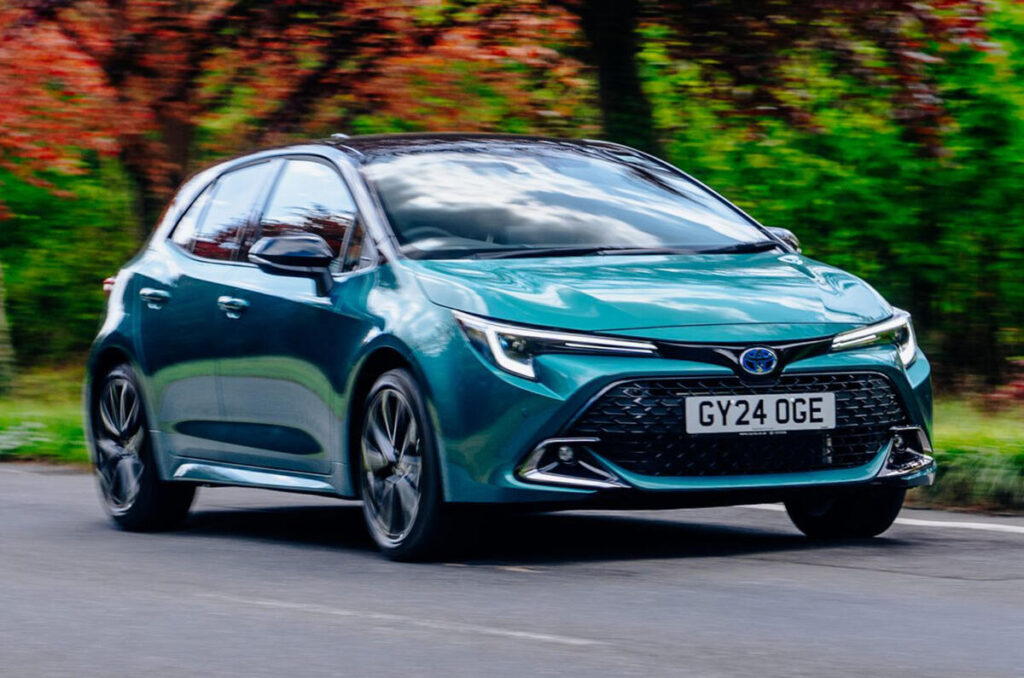
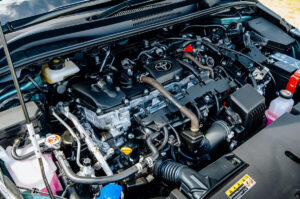
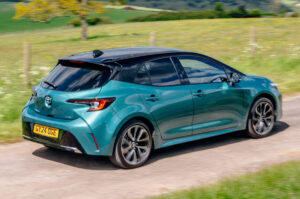
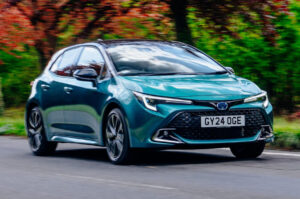
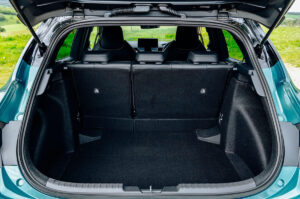
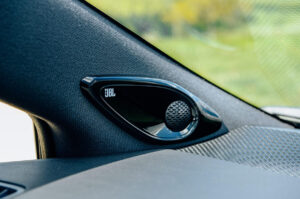
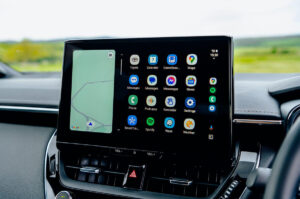
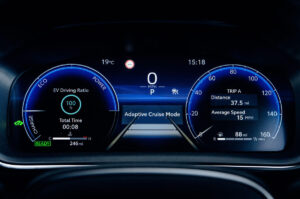
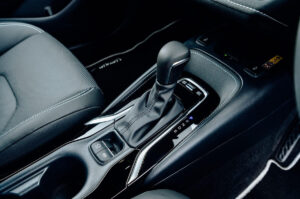
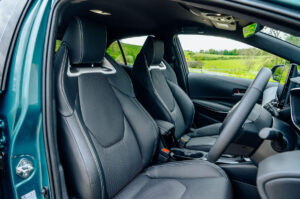
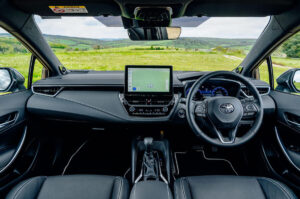
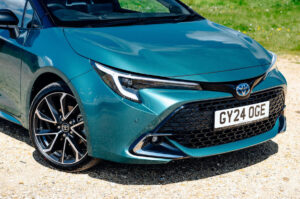
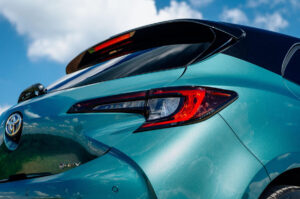
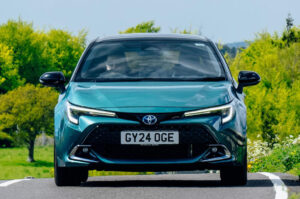
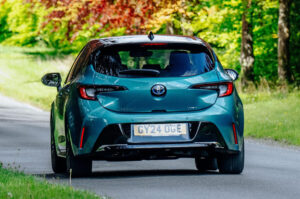
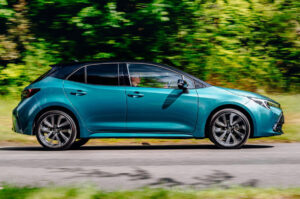
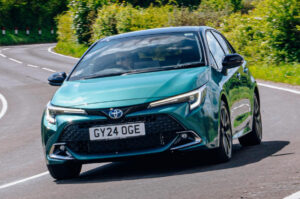
Toyota Corolla Hatchback : The Toyota Corolla has long been a cornerstone of the compact hatchback market. Since its global debut in 1966, it has become one of the world’s best-selling cars. After a brief replacement by the Auris in 2008, Toyota reintroduced the Corolla name in 2019, aligning it with the brand’s push to shed its “boring car” image. Now in its 12th generation, the Corolla continues to compete with rivals like the Volkswagen Golf, Honda Civic, and Mazda 3. For 2025, Toyota introduces minor design tweaks, updated technology, and an adjusted hybrid powertrain.
Design and Styling
Built on Toyota’s TNGA platform, the Corolla benefits from a low center of gravity and a strong, rigid chassis. This provides both agility and stability, supported by its multi-link rear suspension – uncommon in this class.
- Exterior look: Sleek but uncontroversial, the design balances dynamism with universal appeal. The facelift introduced in 2023 added sharper headlights, J-shaped LED running lights, and new alloy wheel designs. For 2025, Toyota adds gloss-black mirror caps, fresh paint options like “Metal Oxide” red, and updated trim details.
- Size comparison: It sits longer than the VW Golf yet shorter than the latest Civic, giving it a compact yet practical footprint for urban driving.
Interior Quality and Comfort
Step inside, and the Corolla prioritises durability over luxury. Toyota’s design philosophy here leans toward simplicity and robustness.
- Pros: Physical buttons for climate and essential functions make it intuitive and user-friendly. The new synthetic leather trim in higher-spec Excel models looks premium without sacrificing practicality.
- Cons: The multimedia system feels dated compared to competitors, and rear passenger space is tighter than in rivals like the Seat Leon. The 313-litre boot (2.0 hybrid) is smaller than class averages, though the Touring Sports estate version adds useful versatility.
Infotainment and Technology
Infotainment remains the Corolla’s weak point.
- A 10.5-inch Toyota Smart Connect+ screen is standard across trims, offering Android Auto (wired) and Apple CarPlay (wireless).
- The system suffers from laggy responses and an unintuitive layout, while physical shortcut keys are largely absent.
- A 12.3-inch digital driver display is included, clear enough but less customisable than rivals.
Toyota Safety Sense is standard, with adaptive cruise control, emergency braking, and lane-keeping assist. Higher trims add blind-spot monitoring and rear cross-traffic alert.
Engine Options and Performance
The Corolla is available with two full-hybrid petrol engines:
- 1.8-litre hybrid: 138bhp, sufficient for everyday use, with a 0–62mph time of around 9.4 seconds.
- 2.0-litre hybrid (Excel trim tested): Now producing 176bhp, down from 193bhp, due to emissions-driven software adjustments. Despite the reduced output, performance figures remain unchanged, with 0–62mph in 7.4 seconds.
Both engines are paired with Toyota’s e-CVT transmission. While smooth and efficient, it generates the characteristic “rubber-band” effect and engine drone under hard acceleration. The hybrid system excels in urban driving, offering quiet electric-assisted movement and strong fuel efficiency.
Ride and Handling
Toyota’s suspension tuning is one of the Corolla’s strongest points. Soft springs balance comfort with composure, ensuring the car feels stable yet agile through corners. Steering is light but accurate, giving confidence even on winding roads. Ride quality varies slightly with wheel size, with 16-inch options offering the best balance. Road noise at higher speeds is noticeable but not excessive.
Fuel Economy and Running Costs
Real-world economy hovers between 55–60mpg, regardless of engine choice. During testing, the 2.0-litre Excel achieved 57.1mpg, close to Toyota’s claim. With a 43-litre fuel tank, a range of around 520 miles is realistic.
Like other Toyota models, the Corolla comes with a 3-year standard warranty, which extends up to 10 years (100,000 miles) with regular dealer servicing. The hybrid battery warranty can extend up to 15 years, further cementing Toyota’s reputation for reliability.
Verdict
The 2025 Toyota Corolla may not revolutionise the hatchback segment, but it continues to deliver where it matters: comfort, economy, and dependability. Its strong chassis, efficient hybrid system, and user-friendly design make it an excellent choice for family buyers who value practicality over excitement.
Strengths
- Smooth hybrid powertrain with strong fuel economy
- Balanced ride and handling
- Durable and well-built interior
- Long-term reliability backed by extended warranty
Weaknesses
- Infotainment system feels outdated
- Cabin space lags behind some rivals
- CVT gearbox noise under heavy load
Overall, the Corolla remains one of the most rational choices in the compact hatchback class. For buyers prioritising low running costs, ease of use, and bulletproof dependability, it continues to be a worthy shortlist contender.



